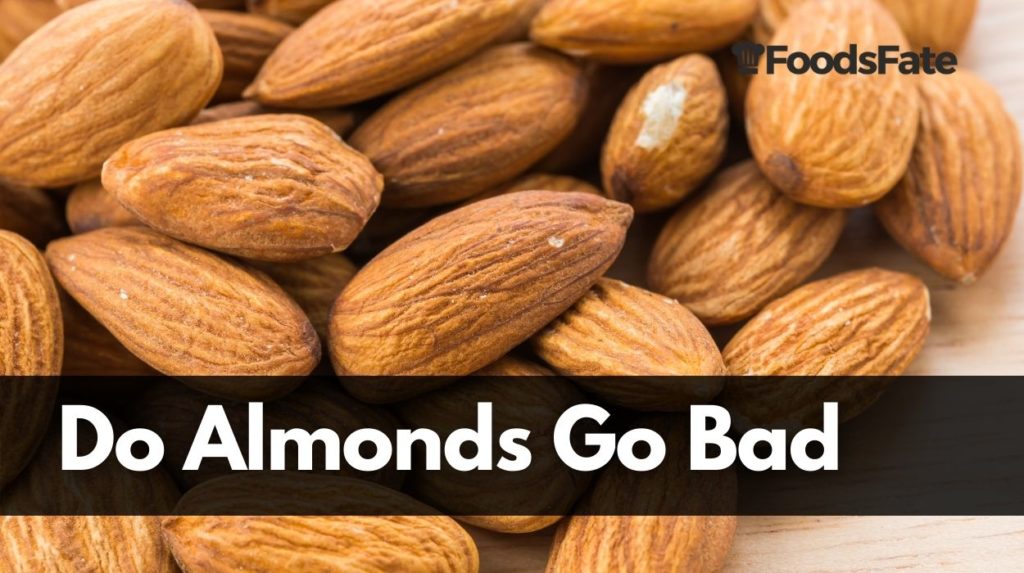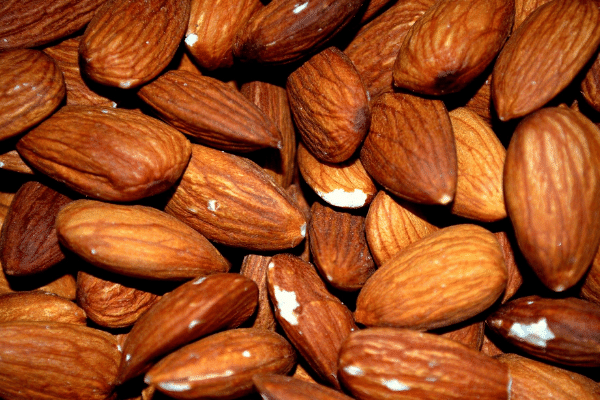
There are two case scenarios for bringing home a packet of almonds- either you’ll finish it up in a few weeks, or you’ll find your almond packet laying dormant at the back of the pantry.
If the latter scenario is more likely in your house, you might want to learn a few tricks for storing almonds as they tend to go bad. When stored under recommended conditions, almonds have a shelf life of more than 2 years. But you can elongate it with the correct storage techniques.
If that sounds intriguing, we suggest reading the following article and keeping the pointers in your back pocket while storing almonds. Along with that, we have explained the side effects of consuming bad almonds so that you can keep your health in check.
What is the Shelf-Life of Almonds?
The University of California confirms that raw almonds stay fresh and good for one year, while the Almond Board of California states that they can keep their peak quality for 24 months. So, Almonds lovers can assume that the raw nuts can stay fresh and in peak quality for up to 12 months, or even longer, if stored properly.
For unopened packs of Almonds, you must consider the printed use-by date on the label to know how long it can sustain peak quality. But, it won’t expire or spoil quickly in a week past the printed use-by date. But, the peak quality and taste may start degrading with time.
It is better to finish the opened pack of almond snacks as soon as possible after opening. You must check the label for more precise information. However, the fair estimate is two weeks in the pantry and 30 days in a fridge.
| Items | Pantry | Fridge |
| Raw Almonds | – | One Year or More |
| Unopened Snack Almonds | Use-By Date Plus Two to Four Weeks | – |
| Opened Snack Almonds | Two Weeks | One Month |
These periods are only rough estimates for best quality. For snack Almonds, it is better to read the instructions on the label rather than relying on these estimates.
What are the Spoilage Signs of Almonds?

Like other nuts, Almonds can go bad, especially when stored improperly. So, you must know what to look for to distinguish between stale and fresh Almonds. Below are some spoilage signs that can help you know when your Almonds have gone bad and are no longer edible.
Change in Smell
Fresh Almonds will radiate a delicious nutty and pleasant smell. But, when the refreshing nutty smell converts into a sour, bitter, or paint-like smell, the Almonds have gone bad.
A mild nutty smell doesn’t indicate that it has gone bad. The rancidity refers to the oils in the nuts being oxidized. It changes the smell and makes it bad and inedible.
Taste Change
Fresh Almonds have a nutty and sweet taste. But, when the nuts start to go bad, it gives a harsh, bitter, and nasty sour taste.
If your Almonds are not pleasant and refreshing in taste, avoid eating them as they may cause digestive issues.
Insect Infestation
Almonds that are not correctly stored often attract insects and pantry bugs. These insects and bugs can spoil the entire stock of Almonds. The insects and pantry bugs get inside the container and spoil the stock.
You will see holes in the Almonds, which means the nuts were contaminated, so you must discard them without using them further.
Mold Growth
The appearance of mold or bacteria on any part of the Almonds means the nuts have gone bad. Dark specks or bacterial growth in the Almonds indicate rancid or stale nuts, which are no longer edible.
What Happens When You Eat Spoiled Almonds?

Almonds are not poisonous, but the rancid oil in the nuts is no longer effective for your health. The rancid oil in the nuts will make the nuts taste stale. People who eat stale Almonds in excessive quantities may experience chronic health issues. So, you must not eat stale Almonds because they may affect your digestive system and make you sick with harmful symptoms.
Almonds have cyanide but in very little quantity. It is rich in vitamin E, fiber, and healthy fats. People who eat stale Almonds may experience cyanide poisoning, and if you suspect such poisoning contact your healthcare provider immediately.
Until the Almonds are fine and fresh, there is no harm in consuming them. But, after it has gone bad or spoiled, you must not eat it as it may make you sick. Since new molecules form in the Almonds after oxidation, it may cause digestive issues. Besides, stale Almonds are less nutritious because the oxidation ruins the healthy fats and other vitamin content. So, it is better to avoid eating rancid and stale Almonds.
Can You Freeze Almonds? Refrigerated Vs. Shelf-Stable

Almonds are rich in fatty oils, and they can easily go bad when stored at warmer temperatures. So, undoubtedly, freezing is the best storage method for Almonds. There is no special requirement to freeze the Almonds.
Freezing helps heighten the shelf-life of Almonds. The unshelled Almonds can stay fresh and in peak quality for up to twenty months in a freezer. The shelled Almonds last for ten months in a freezer when properly stored.
Depending upon the expiry date printed on the label, you can freeze the pre-packed Almonds. The printed use-by date is not always accurate, and it lasts even shorter or longer than the printed date. But, freezing will always help increase the shelf-life of Almonds.
- Use an airtight container to freeze the Almonds.
- Dispel excess air from the container before freezing to prevent oxidation
- Freeze the container tightly and well-sealed
- If the package is unopened, you can freeze them in the original package.
Refrigerated
Raw Almonds can last for more than 12 months in a fridge. The product’s characteristics help determine the shelf-life of Almond seeds when refrigerated.
The shelled or unpeeled Almonds can last for eight months when stored correctly in a fridge, while the unshelled counterparts can last up to 16 months in a fridge.
The pre-packed Almonds come with a printed use-by date on the label, giving a rough estimate of how long they will last in a fridge. If the package has no label, you can assume the Almonds will stay fine and fresh for one month in a fridge.
Shelf-Stable
Raw Almonds have a shelf-life of one year, provided that it is stored properly. The shelled Almonds can stay fresh and suitable for up to six months in your pantry before it starts to degrade. However, the unshelled Almonds are exposed to heat, oxygen, and humidity, and hence they have a shorter shelf-life of four months.
When stored outside a fridge, the pre-packed Almonds remain good and fine up to the printed use-by date. The printed date is an estimate as Almonds can last longer depending on how well you store them in your pantry. If the pre-packed Almonds have no label, you can assume that the Almonds will stay fresh for up to two weeks at room temperature.
What are the Methods to Store Almonds?
As mentioned, Almonds have high fatty oil content, so the nuts can easily absorb oxygen, heat, and moisture from the environment. It also absorbs foul smells from other foods when stored improperly. So, below are some of the helpful methods to ensure proper storage of the leftover Almonds.
Store in Cool, Dry, and Dark Places
If you have a sealed and unopened package of Almonds, it is best to store it in cool, dry, and dark places in your pantry. It would help if you stored it in spots away from heat sources, oxygen, and moisture.
Besides, you must not store the Almonds in places where other smelly foods are stored. Almonds absorb the smell from food easily, and it may spoil the Almonds inside the package.
Store in Airtight Container or Re-Sealable Bag
Strong smell and moisture are the components that the Almonds easily absorb. So, you must have an airtight or re-sealable bag to store the leftover Almonds after opening.
The airtight containers and re-sealable bags prevent oxidation and keep the foul smell from foods at bay. The Almonds stay safe and fresh for a long time.
Store Almonds Well-Ventilated
Storing Almonds in your pantry under room temperature is less effective than cold storage. So, you must ensure storing the Almonds in a cold environment of a fridge or freezer. But don’t forget to keep the Almonds well-ventilated.
If you are storing the Almonds in a fridge, you have to use an airtight container or re-sealable bags. But when you store it in your pantry, ensure to use well-ventilated storage bags to keep the nuts well ventilated and prevent them from spoiling.
Read More:
Alternatives for Almonds if They Have Gone Bad
If you have to add almonds to your dishes, but the ones in your pantry are showing signs of spoilage, you can use the following alternatives:
- Hazelnuts
- Cashews
- Brazil nuts
- Unsalted pistachios
- Peanuts
Frequently Asked Questions
Why Do Almonds Expire or Spoil?
When the fatty oil content from Almonds oxidizes, the Almonds start to degrade and eventually spoil. Besides, exposure to light, heat, and oxygen causes the oils to go rancid. Air and humidity are also contributing factors to the rancidity of Almonds. When you eat spoiled Almonds, it will cause digestive issues with an upset stomach.
How Long Almonds Stay Good and Edible Past Expiration Date?
Raw Almonds last for several months past its use-by date. It is estimated that Almonds last up to one year past the printed use-by date. But, you must use the Almonds as early as possible past their expiry date to enjoy their peak quality and freshness.
How do you fix rancid almonds?
You can try fixing expired almonds by undertaking a few steps. Start by preheating the oven to 275 degrees F. Place the almonds on the baking sheet and pop them in the oven for 5-7 minutes. This will help you restore their original flavor and crispiness.
How long do almonds last at room temperature?
Unshelled almonds last for about 2 to 4 weeks at room temperature. It is advisable to keep them in the refrigerator to elongate the shelf life.
The Bottom Line
Almonds are the best breakfast snack, and it needs extreme care and attention to the last longer. It has high fatty oil content, and it is likely to go bad quickly when stored improperly and exposed to humidity, oxygen, and moisture.
It is essential to store the Almonds in an airtight container to prevent oxidation and bad smells from spoiling them. You have to check a couple of spoilage signs before using it.
If you doubt or are unsure about the freshness and quality of the Almonds, discard them, as consuming bad Almonds can cause an upset stomach and other digestive issues.



